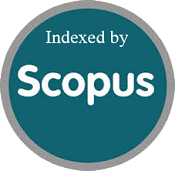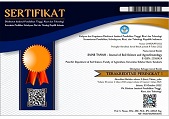Sains Tanah journal must ensure that all published works within the journal adhere to academic publishing ethics. As a result, it is critical to establish an ethical standard for all stakeholders to foster a positive environment and avoid problems that may arise as a result of a conflict of interest. This document presents Sains Tanah journal's policy on publication ethics and malpractice statement as guidance for all journal stakeholders. The following rules are comply with COPE's (Committee on Publication Ethics) guidelines.
DUTIES OF AUTHORS
- Original research reports' authors are required to give a precise account of the work done and a dispassionate analysis of its significance. The supplied document must also accurately describe the underlying data. Enough explanations and references must be included to inspire others to replicate the effort. Inputting false information intentionally or fraudulently is inappropriate and immoral.
- When necessary, authors must supply primary data for editorial assessment of the manuscript.
- It must be stated by the authors that only their original works have been published. The authors are required to credit and reference any authors whose words or works they have used.
- To avoid unethical and unjustifiable publishing practices, manuscripts that fundamentally represent the same research project shouldn't be published in more than one journal or principal publication.
- To properly acknowledge the work of others is a responsibility. When reporting a piece of work, the authors must cite any papers that affected its specifics.
- Only those who have significantly contributed to the conception, design, execution, or interpretation of the reported study should be listed as authors, which entails naming specific people as co-authors. However, only individuals who participate in the substantial components of a given research study should be acknowledged as contributors or co-authors. Only legitimate co-authors must be listed in the work, according to the corresponding author's assurance. These people have reviewed and approved the paper's final draft before it is submitted for publication.
- Any financial flow or other major potential conflicts of interest that might be perceived to affect how their paper is interpreted must be disclosed by all authors. Additionally, the study project's financing sources should all be stated.
- Any serious error or inaccuracy found by the author after the work has been published should be retracted and remedied by getting in touch with the editor or publisher of the journal.
- If there are any hazardous materials, methods, or equipment that provide special risks when used, the author must make that clear in the article.
DUTIES OF EDITORS
- A manuscript must always be reviewed by an editor for its intellectual content, regardless of the authors' gender, ethnicity, ethnic origin, religious beliefs, sexual orientation, citizenship, or political ideas.
- The editor and any editorial staff, if necessary, are not permitted to reveal any material discovered in the manuscript that was given to anybody save the corresponding author, reviewers, potential reviewers, other editorial advisors, and the publisher.
- Any unpublished material disclosed in the submitted work may not be used by editors without the authors' written consent. Which of the submitted research papers will be published is decided by the journal's editorial board. The choices should be made based on the significance of the research to readers and researchers as well as the validity of the relevant research. The editorial policy of the journal may serve as a guide for the editors, and constitutional prohibitions against defamation, infringement of intellectual property rights, and plagiarism may impose restrictions. Additionally, the editor may seek advice from other editors or reviewers when making decisions.
- The editor is responsible for ensuring that the originality of every manuscript's composition has been evaluated, as well as for arranging and utilizing peer review sensibly and judiciously. The editor should also explain the peer review procedures to the writers and note which parts of the paper have undergone peer review. Editors must perform authoritative peer reviewers for papers being evaluated for publication by choosing people with appropriate expertise and rejecting those with conflicts of interest.
DUTIES OF REVIEWERS
- Peer review aids in editorial decision-making by the editor and helps the authors improve their work through editorial debates.
- Each chosen reviewer is obligated to contact the editor and withdraw from further participation in the review process if they feel unqualified to examine the research work in a manuscript or realize that an immediate evaluation would not be possible.
- Reviews must be conducted objectively; personal judgment is improper; the reviewer must plainly state their points of view and provide supporting evidence.
- All submitted manuscripts must be handled as classified information. Additionally, they should not be shared or examined with others unless specifically permitted by the editor.
- Unique information or insights obtained through peer review must be treated as confidential information and must not be used for personal gain. Additionally, reviewers are not required to assess manuscripts that have conflicts of interest due to a collaborative, competitive, or other relationship with any of the authors, corporations, or organizations.
- Reviewers need to differentiate between papers that are comparable but that the authors haven't cited. Every description that makes use of a previously published interpretation, inference, or statement should also include the proper citation. Finally, reviewers should alert the editor to any similarities or overlaps between the manuscript under consideration and any other works that have already been published that they are personally aware of.
PUBLICATION MISCONDUCT
- Throughout the entire publication process, authors, editors, and reviewers should uphold the integrity of the academic record. Business requirements shouldn't be allowed to compromise moral and ethical principles.
- Sains Tanah journal will adhere to the Committee on Publication Ethics flowcharts (https://publicationethics.org/guidance/Flowcharts) when the submission (or publishing) of a manuscript may have ethical issues, such as plagiarism, redundant (duplicate) publication, falsified or fraudulent data, an unreported conflict of interest (CoI), or other issues. The Chief Editor will make the choice when the Editorial Board team has had a chance to consider it. Those who break the regulations will also be subject to punishment











.png)





